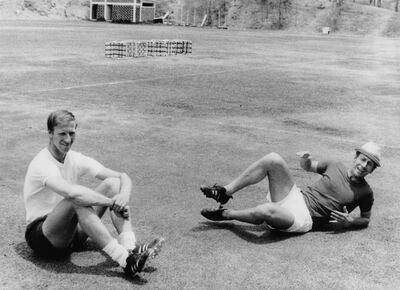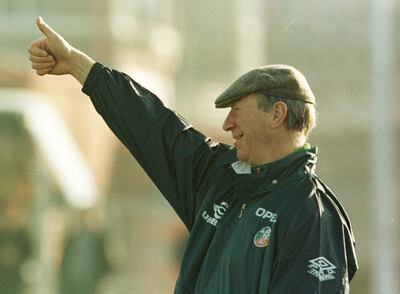Jack Charlton, who died at 85, leaves a unique legacy.
He played a pivotal part in taking two countries, England and the Republic of Ireland, to levels they had not reached before, have not done since and may never do again on the global stage.
As a cornerstone of Leeds United’s greatest team, and the man whose club record of 773 appearances may never be beaten, he was a specialist in improbable success.
Charlton was defined by World Cups. He remains the only man to win the World Cup with one country and to reach the quarter-final as the manager of another.
Along with Bobby, he is one of only two pairs of brothers to win the World Cup, after the German duo of Fritz and Ottmar Walter in 1954.
He is the sixth of Sir Alf Ramsey’s team of 1966 to die but his achievements make him one of England’s immortals.
He was one of the least likely of those World Cup winners. His mother was the cousin of Newcastle’s legendary goalscorer Jackie Milburn but, unlike his brother and Bobby Moore, he was not groomed for greatness at an early age.
Charlton briefly worked in coal mines, as his father Robert did. He was signed by Leeds but sometimes used as a centre-forward and, in his own words, could be a “one-man awkward squad”.
Liverpool and Manchester United had tried to buy him but, as he approached his 29th birthday, he was still a Division Two footballer. His first cap for England came a few weeks before he turned 30.
“Jack, you know I don’t always pick the best players,” Ramsey told him, but Charlton proved a more physical foil to the classier Moore.
His excellence in the air completed the 1966 defensive unit: Ray Wilson and George Cohen flanked the centre-backs, Nobby Stiles tackled in front of them and Gordon Banks saved behind them.
Charlton was to concede a penalty for handball in the semi-final against Portugal, but Bobby scored twice. He gave away the free kick that led to Wolfgang Weber’s equaliser in the final, but Geoff Hurst completed a hat-trick in extra time.
The Charlton brothers’ relationship was not always close, but they both retired from international football on the flight back from the 1970 World Cup when Jack only played once.
He was being phased out by his country but he remained integral for his club. Don Revie’s Leeds were nearly men at times but Charlton still won the league, the FA Cup, the League Cup and two Fairs Cups.

He and his centre-back partner Norman Hunter both played more than 700 Leeds games; so did four more of Revie’s team. They could be formidable, uncompromising and even violent, but they could play and, in 1967, Jack Charlton succeeded Bobby as Footballer of the Year.
He played until he was 38, moved into management and won promotions with Middlesbrough and Sheffield Wednesday.
Yet his career seemed to be going nowhere after an underwhelming year in charge of Newcastle. Instead, he was appointed Republic of Ireland manager in 1986. Chosen instead of the triple European Cup winner Bob Paisley, he proved an inspired choice.
Ireland had never played in a major tournament. Charlton ended that in a transformative reign that made him a national hero in a second country.
His football could be direct, and perhaps talented players could have played in more entertaining style, but he raided the Irish diaspora, generated a remarkable team spirt and used his under appreciated tactical nous to produce some astonishing results and unforgettable memories.
Ireland beat England in Euro 1988, their first competition, and the eventual finalists Italy in New Jersey in the 1994 World Cup, both with goals by the Glaswegian Ray Houghton.
Most remarkably, Ireland marked their first World Cup, in 1990, by going to the quarter-finals, albeit without winning a game, and only losing narrowly to the hosts Italy.
Half a million people welcomed them back in Dublin afterwards. Charlton resigned after failing to qualify for Euro 1996, but he had helped shape Irish identity, during the evolution of a country from a sporting and economic backwater to a bigger player on the world stage.
A blunt talker with a famously good sense of humour, Jack Charlton helped change Leeds, England and Ireland.



